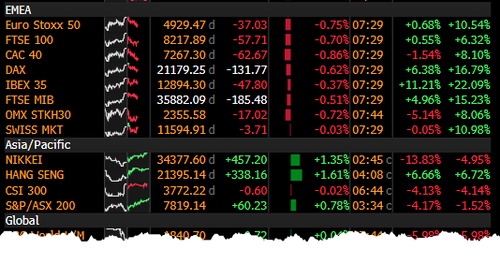A Delta Air Lines plane takes off from Hartsfield-Jackson Atlanta International Airport, in Atlanta, Ga., on Nov. 22, 2022.
Brynn Anderson/The Canadian Press Delta Air Lines DAL-N pulled its financial forecast for this year on Wednesday, citing economic uncertainties caused by U.S. President Donald Trump’s sweeping tariffs.

The Atlanta-based company also projected its current-quarter profit below expectations, saying travel demand has “largely stalled”. U.S.
consumer and business confidence has sharply weakened as tariffs on imports from most of the world have brought in the specter of higher inflation and slower economic growth. Global brokerages have raised their odds for an economic recession. With travel a discretionary item for many consumers and businesses, growing risks of a downturn have clouded the airline industry’s outlook and sparked a selloff in shares.
“With broad economic uncertainty around global trade, growth has largely stalled,” Delta CEO Ed Bastian said in a statement. “Given the lack of economic clarity, it is premature at this time to provide an updated full-year outlook.” Delta said it expects a profit in the range of $1.
70 a share to $2.30 a share in the quarter to end-June. The midpoint of the forecast is $2 per share, compared with analysts’ average estimate of $2.
30 per share, according to LSEG data. Underscoring the uncertainty, Delta said its total revenue in the second quarter would be down 2 per cent to up 2 per cent from a year ago. Bookings from both leisure and corporate customers have softened, hitting the demand for domestic travel, it said.
Demand for premium and international travel, however, has remained resilient. However, shares of the carrier were up 2 per cent in premarket trading after the company reported an adjusted profit of 46 cents a share for the first quarter versus the 38 cents anticipated by analysts. Last month, the company had slashed its March quarter profit estimate by half on mounting economic worries.
The airline’s shares have lost 41 per cent this year and are down 50 per cent from their 52-week high. Similarly, rival United Airlines’ stock has slumped 68 per cent from its 52-week high. The broader NYSE Arca Airline index has declined 31 per cent this year, underperforming the broader S&P 500 index.
Delta was the first major U.S. carrier to report its earnings.
United is due to report its first-quarter results on April 15. Analysts expect similar commentary from Delta’s rivals. Major carriers last month cut their first-quarter earnings estimates, saying rising economic uncertainty has led to a pullback in corporate and consumer spending.
Some indicators are signaling more pain ahead. Air tickets sold through third-party online travel agencies for summer travel to Europe are down about 13 per cent from a year ago, according to aviation analytics firm Cirium. With demand slowing, U.
S. airlines have started culling flights to avoid lowering fares and protect margins. Delta said on Wednesday it is reducing its planned capacity growth in the second half of the year to flat from a year ago.
It previously expected to grow capacity by 3 per cent-4 per cent. Bastian said the company was also “actively” managing costs and capital expenditures. “In this slower-growth environment, we are protecting margins and cash flow by focusing on what we can control,” he said.
.
Business

Delta Air Lines pulls financial forecast for this year as Trump tariffs stall travel demand

The Atlanta-based carrier also projected its current-quarter profit below expectations















